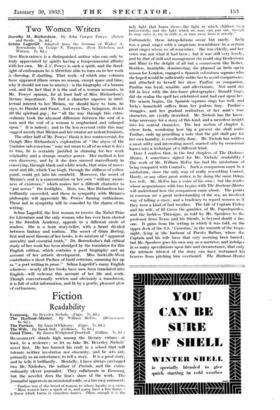Two Women Writers
Miss IIIC1ianDSoK is a distinguished author who can only be truly appreciated by spirits having a temperamental affinity with her own. Mr. J. C. Powys is such a spirit, and the flood- light of enthusiasm he is therefore able to turn on to her work is cheering, if startling. That work—of which nine volumes have appeared (there seems no reason, except space and time, why it should not run to ninety) --is the biography of a human Soul, and the fact that it is the soul of a woman accounts, in Mr. Powys' opinion, for at least half of Miss Richardson's literary importance. To find a character superior in intel- lectual interest to her lifiriam, we should have to turn, he says, to Hamlet and Faust. And even they beingmen, do not fill the spiritual gap ; for " all the way through this extra- ordinary book the abysmal difference between the soul of a man and the soul of a woman is emphasized and enlarged upon." It is indeed ; and to the less reverent critic this may suggest merely that Miriam and her creator are ardent feminists.
The other half of Mr. Powys' thesis is less controversial, for though Miss Richardson's exploration of " the abyss of the fominine sub-conscious " may not mean to all of us what it does to him, he is certainly justified in claiming for her work originality and a strange creative power. Her method is her own discovery, and by it she does succeed marvellously in conveying, through black and white words, that sense of move- ment and life, which Van Gogh, through the stiffness of yellow paint, could get into his cornfield. Moreover, the secret of Miriam's soul is a concentration on her own " solitary aware- ness of existence," which makes her a difficult character to " put across " the footlights. Here, too, Miss Richardson has brilliantly succeeded, and those in sympathy with Miriam's philosophy will appreciate Mr. Powys' flaming enthusiasm. Those not in sympathy will be consoled by the charm of his writing.
Selma Lagerldf, the first woman to receive the Nobel Prize for Literature and the only woman who has ever been elected to the Swedish Academy, appeals to a different circle of readers. She is a born story-teller, with a heart divided between fantasy and realism. The secret of Costa Beefing, first and most famous of her books, is its mixture of " apparent unreality and essential truth." Dr. Berendsohn's !kill critical study of her work has been abridged by the translator for this English edition, which contains a good biography and an account of her artistic development. Miss Sackville-West contributes a short Preface of lucid criticism, summing her up as " a poet writing in prose." Selma Lagerliirs many English admirers—nearly all her books have now been translated into English--will welcome this account of her life and work. Though conventionally written and obviously a translation, it is full of solid information, and lit by a gentle, pleasant glow of enthusiasm.




































 Previous page
Previous page